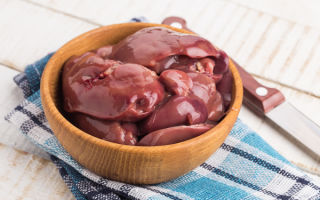Content
- 1 The chemical composition of turkey liver
- 2 Nutritional value and calorie content of turkey liver
- 3 The benefits of turkey liver
- 4 Turkey liver for weight loss
- 5 How to cook turkey liver properly
- 6 What can be made from turkey liver
- 7 Turkey liver damage and contraindications
- 8 How to choose and store turkey liver
- 9 Conclusion
Turkey liver is a unique dietary product that is increasingly found in Russian stores. For buyers accustomed to traditional types of poultry, it is important to know what are the benefits and harms of turkey liver, how it differs from, say, a chicken counterpart.
The chemical composition of turkey liver
The beneficial properties of the turkey liver are provided, first of all, by the vitamin groups A, PP, B5, B6, B9, E, which are necessary for general human health, which are present in it. The present vitamin K group improves metabolism and strengthens bones. There are many minerals in it, such as selenium, iron, potassium, magnesium, sodium.
The table below will help to estimate the content of useful minerals in relation to the daily requirement of a person.
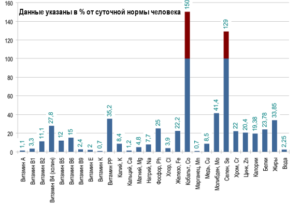
The low cholesterol content in turkey meat allows you to fearlessly use it as a dietary meat product, which will not increase the risk of cholesterol plaque formation on the walls of blood vessels. In addition, its glycemic index is zero, which means it does not affect blood sugar levels.
Nutritional value and calorie content of turkey liver
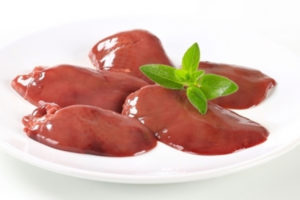
Unlike most types of poultry, 100 grams of turkey liver of a turkey has a high calorie content, which surpasses, for example, chicken counterpart. Therefore, the use of turkey by-product is recommended when recovering from various diseases, except for overweight people.
|
Method of preparation or type of product |
kcal per 100 gr. liver |
|
Raw |
276 |
|
When cooking and stewing |
207-248 |
|
When frying with oil (vegetable) |
~302 |
|
For a couple |
262-267 |
Among other things, this offal is very much appreciated by amateurs for its original taste properties, which combine the richness of veal with the softness of chicken.
The benefits of turkey liver
Since the composition of the liver tissue of a turkey contains almost all "meat" substances, its use in food, while maintaining the benefits, minimizes the harmful effects of meat food on the body.
For adult men and women
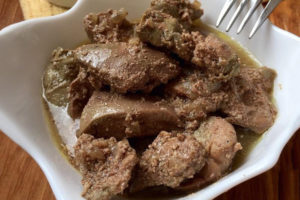
Turkey liver has exceptional nutritional properties that affect the body in the following aspects:
- improving the total blood composition, quality and properties of plasma, rapid replenishment of blood loss, normalization of the number of leukocytes, erythrocytes, platelets.
- strengthening the body's immunity;
- normalization of the stomach together with the pancreas;
- strengthening the walls of blood vessels;
- normalization of the nervous system;
- improving the condition of the skin, nails, human hair;
- regeneration after injury.
Vitamin E increases the body's resistance to the harmful effects of the environment as well. body tissues - in relation to tumors. Its benefits are also tangible in infectious diseases.
The property of selenium included in the product to synthesize thyroid hormones is of great benefit in stimulating the hormonal system and in improving the absorption of iodine.
Zinc in the liver helps provide the conditions necessary for testosterone synthesis. More than 3.5 mg of this element contained in 100 g of the product covers about 30% of a person's daily need for it.
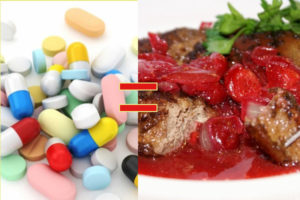
During pregnancy and breastfeeding
The main benefit of a turkey liver when feeding with breast milk and carrying a child is precisely that this type of meat product has very few contraindications. This means that a nursing or expectant mother has the opportunity to consume the valuable by-product of this bird in food with almost no restrictions.
The use of turkey liver during pregnancy brings great benefits to the fetus in the form of saturation of the body with folic acid, iron and vitamins, which, in turn, allow the unborn child to form normally.
For children
Vitamin and mineral nutrients that the product is rich in will help in general development, as well as improve the health of the child.
The turkey liver contains such an essential amino acid as taurine, which is important for the normal development of infants and young children. It promotes intensive nutrition of the brain during a period when the child's body is growing rapidly.
Its use will stimulate the immune system and will benefit the development of the child's bone tissue. The beneficial properties of the dish are complemented by a pleasant taste, thanks to which children are more willing to eat a product that is so necessary for health.
For the elderly

The problem of anemia is associated with iron deficiency, which, in addition to children and pregnant women, is very susceptible to the elderly. Eating the liver helps to cover the body's daily iron requirement of 18 mg. A special benefit of turkey liver lies in the iron content, which is double that of beef.
Zinc is an essential element to keep the immune system healthy.
B vitamins are necessary in old age for the effective restoration of microdamage to muscle fibers
This excellent nutritious and easily digestible product helps in the normalization of the body's metabolism, which is very important for the elderly.
With pancreatitis and gastritis
Gastrointestinal problems such as pancreatitis and gastritis require a strict diet with a minimum of meat products. This is where the turkey liver comes in. Turkey meat can be safely consumed even in the acute phase of the disease, when products are limited as much as possible, since it has important properties:
- easy digestibility;
- nutritional value;
- lack of coarse dietary fiber;
- minimum fat content;
- low cholesterol, which reduces the inevitable harm from eating meat products;
- hypoallergenic.
This gives reason to give a positive answer to questions about the benefits of eating turkey liver in the menu of people with pancreatitis and gastritis.
With diabetes mellitus
The zero glycemic index of this offal due to the complete absence of fiber makes it possible to use it in any quantity for people with impaired blood sugar levels.
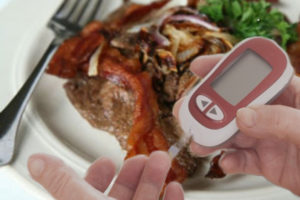
For athletes and allergy sufferers
For people suffering from allergic reactions to various food products, including some types of meat products, turkey liver is just a godsend, since it can provide all valuable nutrients and protect against the use of other meat products with allergens that can cause harm. Allergy to such meat is rare, therefore, the consumption of such a product, which is useful for its hypoallergenic properties, can be prescribed by the attending physician, with appropriate individual indicators.
Among athletes, turkey liver is valued as a healthy and protein-rich source, in addition, having properties to help recover from various injuries.
Due to the high dose of the presence of group B in the product, namely: vitamin B 12 (cobalamin), B2 (riboflavin) and vitamin B3 (niacin), the invaluable benefit of the product manifests itself in the ability to transform proteins, fats and carbohydrates, ensuring the correct course of energy metabolism, especially for people with high physical activity.
Indeed, in one hundred grams of liver there are about 19 g of proteins with high biological significance, which are only slightly inferior to the amino acid composition (aminogram) of traditional meat. It is also noteworthy that, according to the aminogram, the turkey liver is richer than quark cottage cheese, which is valuable for a protein diet. Athletes use these unique properties of the liver by including it in their diets to build muscle.
Turkey liver for weight loss
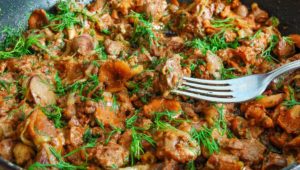
Despite the fact that the liver part of a turkey is a high-calorie product, some nutritionists recommend using it as part of various weight loss diets. This recommendation has a completely scientific basis. The liver of a turkey is not only nutritious and useful, but also capable of being easily absorbed, which means that it can give the body a feeling of fullness at fairly low consumption rates. In addition, the fibers of this by-product contain various enzymes that speed up the process of food processing. Therefore, nutritionists give the “green light” to turkey liver, knowing the result of its use: maximum benefit and minimum harm.
How to cook turkey liver properly
There are incredibly many ways to prepare this very delicious and healthy product. Such a gourmet delicacy is suitable both for the everyday table and for the festive menu. It is boiled, fried, steamed, stewed, made the basis of cutlets or pies filling, cooked on the grill and grill.
One of the advantages of turkey liver is that its delicate properties allow you to do without preliminary soaking, as required by the cooking technology of a more rigid beef liver.
When cooking, the timer is set for 40 minutes.
For baby food, it is good to beat the product with a blender until a tender soufflé.
When stewing, it is better to add sour cream, the properties of which will emphasize the light consistency of the product.
Vegetables and rice are ideal as a side dish.
What can be made from turkey liver
There are many dishes that are usually prepared from this part of the bird: liver pies, cutlets, goulash. Chops, healthy liver pate, kebabs are made from it - and all this is not a complete list of gastronomic variety.
Thanks to the variety of cooking options, turkey liver dishes will never get bored, and nutritionists agree that it will be beneficial to include 1-2 liver dishes weekly, with a single serving of no more than 150-200 g.
Below you can find the classic turkey liver pâté.
Turkey liver pate
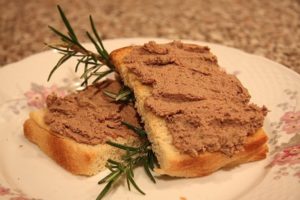
This is a very healthy and delicious pate.
The recipe for this dish is very popular and worth describing separately.
For cooking you will need:
- 500 g liver;
- 2 pcs. onions;
- 50 g olive oil;
- 30 g butter;
- 200 g of mushrooms, preferably champignons;
- 3 cloves of garlic;
- Greens to taste;
- 2 pcs. chicken eggs;
- salt and spices to taste;
Cooking steps:
- Cleanse the liver from the film part, excess fat. Wash and cut into small pieces.
- Greens, garlic, mushrooms, onions, peel and finely chop.
- Boil 2 eggs and peel them off.
- Fry onions, mushrooms, garlic, herbs in a skillet in butter. Mushroom readiness indicator - until brown.
- Add chopped liver to the mass in a pan. Fry everything together for up to 10 minutes.Readiness is determined by the appearance of a brown crust on the liver.
- Transfer everything to a blender or mixer. Season with salt, add boiled eggs and olive oil. Beat until smooth.
Turkey liver damage and contraindications
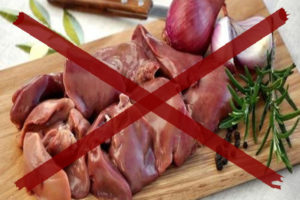
The turkey liver contains a high content of vitamin A, the excess of which is toxic and harmful to health. But once a week, you can indulge in this delicacy without much worry. In particular, physically active people will receive invaluable benefits due to its positive effect on metabolic processes.
In everyday life, there is an opinion that the liver, along with eggs, are real bombs of cholesterol, but in fact they are not the main reason for the increase in its level. In fact, the cholesterol-rich saturated fatty acids found in lard and bacon can do four times more damage.
At the same time, a cholesterol deficiency can, in turn, lead to a choline deficiency, which threatens with impaired liver function, memory impairment, and a weakening of concentration. There is evidence of a link between low choline levels and Alzheimer's disease.
At the same time, overuse of cholesterol-rich foods can contribute to overload and thrombosis.
Therefore, nutritionists say that eating up to 300 mg of cholesterol per day will not do harm, which corresponds to about 80 g of turkey liver or one egg.
And also when assessing the impact on health, it should be borne in mind that the liver contains peptides that are harmful to people suffering from gout.
Contraindications are diagnoses such as pronounced renal failure and a very rare individual allergic reaction to turkey offal.
How to choose and store turkey liver
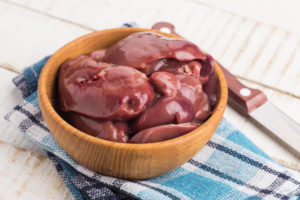
When choosing a liver in a store, you should pay attention to the appearance of the product and follow the basic rules.
You should not buy frozen turkey liver: in this case, there are risks of masking by unscrupulous sellers of a stale product, as well as the loss of its main beneficial properties - with a more optimistic option. It is ideal to buy chilled offal.
The quality can be determined by its appearance: the edges of the pieces should be dense, the structure of the tissues should be uniform, without depressions and damage.
Fresh and healthy turkey liver will always be red-brown in color. Blood clots are unacceptable on it.
Pay attention to the smell: it should be fresh and pleasant.
Conclusion
Having examined the benefits and harms of turkey liver, we can come to the conclusion: liver dishes are undoubtedly tasty and healthy. It should be remembered, however, that moderation and reason must be maintained in everything. If you eat a liver every day, all of the above unique properties of a liver treat will be harmful to your health. A good compromise will be the inclusion in the weekly diet of a dish from this product, which is difficult to replace in its complex effect on health.

